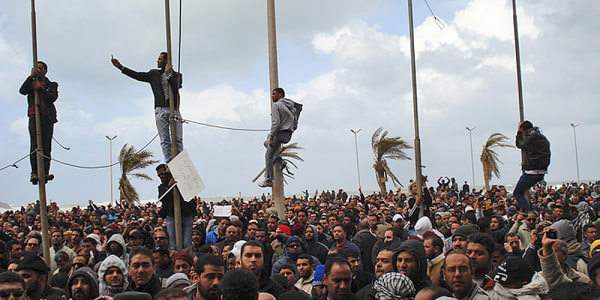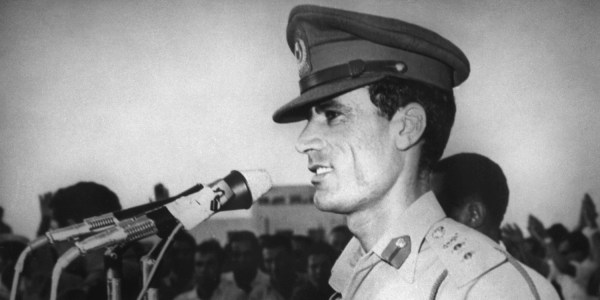Supporters of a no-fly zone over Libya called for a Security Council vote Thursday on a U.N. resolution aimed at preventing Moammar Gadhafi's planes from conducting aerial attacks on the Libyan people.
Britain and France put a draft resolution that would impose a no-fly zone in a final form late Wednesday. The text will be sent to capitals overnight and can still be changed before being put to a vote in the 15-member council.
China's U.N. Ambassador Li Baodong, the current council president, told reporters "we hope we will have real progress tomorrow."
Council ambassadors met behind closed doors to debate the text for more than eight hours Wednesday, and said they would return Thursday morning.
U.S. Ambassador Susan Rice said the Obama administration is "fully focused on the urgency and the gravity of the situation on the ground, and it's my hope that we may be in a position to vote a serious resolution as early as tomorrow. We're working very hard toward that end."
"We are interested in a broad range of actions that will effectively protect civilians and increase the pressure on the Gadhafi regime to halt the killing and to allow the Libyan people to express themselves in their aspirations for the future freely and peacefully," she said. "Those include discussion of a no-fly zone, but the U.S. view is that ... a no-fly zone has inherent limitations in terms of protection of civilians at immediate risk."
Meanwhile, the Libyan army told people in Benghazi to lay down their arms on Wednesday as its troops advanced closer to the rebel stronghold for what could be the decisive battle in the uprising against Moammar Gadhafi.
Gadhafi's son Saif al-Islam, speaking to French-based TV channel Euronews, said his troops were near Benghazi and "everything will be over in 48 hours."
The Libyan army issued an ultimatum warning Benghazi residents to leave rebel-held locations and weapons storage areas by 2200 GMT, Libyan television reported.
Late Wednesday, the International Committee of the Red Cross announced it had withdrawm from Benghazi, fearing an attack by Gadhafi forces.
The ICRC said it had transferred its Benghazi and Ajdabiya staff to the eastern city of Tobruk, from where they will continue to work with conflict victims, the BBC reported.
A text on the screen of Al-Libya television addressed the eastern city's residents, saying the army was coming "to support you and to cleanse your city from armed gangs. It urges you to keep out by midnight of areas where the armed men and weapon storage areas are located."
Meanwhile, The New York Times said four of its journalists were missing in Libya. They are Beirut bureau chief Anthony Shadid, reporter-videographer Stephen Farrell and photographers Tyler Hicks and Lynsey Addario. The Times said it had spoken with Libya government officials who said they were attempting to find out more about the journalists.
“We are grateful to the Libyan government for their assurance that if our journalists were captured they would be released promptly and unharmed,” said executive editor Bill Keller.
The town of Ajdabiya, 90 miles south of Benghazi, was firmly in government hands after most of its rebel defenders retreated under fire from a withering artillery barrage on Tuesday. Those who stayed had handed over their guns, a rebel officer said.
The breakdown of rebel defenses in Ajdabiya, 480 miles southeast of Tripoli, threatened to open the gateway to the long stretch of eastern Libya that has been in the control of the opposition throughout the monthlong uprising. Its fall would allow regime forces to bombard Benghazi, Libya's second largest city and the de facto capital of the opposition, by air, sea and land.
Gadhafi's forces continued shelling the city of 140,000 people overnight and throughout the morning with relentless artillery fire and little resistance from the rebels.
Slideshow 81 photos
Libya's uprising against Gadhafi
An activist hiding out in the city said the rebels were lightly armed but still managed to ambush a group of regime troops marching into the city on foot late Tuesday, but the victory was short lived. Artillery shelling was ongoing, he said.
"The rebels set a trap and managed to take over four tanks, but now I see none of them," Abdel-Bari Zwei said when reached by telephone. "Ajdabiya is witnessing unprecedented destruction. This is the end of the city."
'Under attack'Residents in Ajdabiya fled either to tents set up outside the city or 140 miles northeast to Benghazi.
"The shelling hasn't stopped since last night. The residential areas are under attack," Zwei said, adding that the hospital had been overwhelmed and many of the injured had to be taken to Benghazi.
The city was besieged from the west, where Gadhafi's brigades were deployed from his stronghold of Sirte, and from the north with a warship in the Mediterranean Sea.
"The city is sealed off from the south, from the west and the northern Zwitina port by a warship," he said.
In Benghazi, seat of the insurgents' provisional national council, the mood was a mixture of defiance and nervousness, with some citizens predicting a bloodbath and others confident the rebels would still snatch victory against the government offensive.
Forces loyal to Gadhafi have retaken a string of coastal towns in the past 11 days, reversing gains made by the rebel army early in the uprising against his 41-year-rule of the North African country. Important oil industry facilities are now mostly back under government control.
An artillery bombardment on the rebel-held city of Misrata, east of the Libyan capital, killed at least five people and wounded 11, a doctor at Misrata hospital told Reuters by telephone on Wednesday.
"We have received five bodies so far. We know more people have been killed though. Most of the casualties are coming from the eastern and the southern parts of Misrata," said the doctor, who gave his name as Muftah. Government forces began shelling the city earlier in the day, residents said.
'People are fed up'"People are fed up. They are waiting impatiently for an international move," said Saadoun al-Misrati, a rebel spokesman in the city of Misrata, the last rebel-held city in the west, which came under heavy shelling Wednesday.
"What Gadhafi is doing, he is exploiting delays by international community. People are very angry that no action is being taken against Gadhafi's weaponry."
An armed forces statement read on state television described the offensive as a humanitarian operation to save the people of "beloved Benhgazi" and said troops would not take revenge on them if they surrendered.
"Advise your duped sons to hand over their weapons to the armed forces or the People's Leadership and they will be covered by an amnesty requested by the Commander (Gadhafi), which will be valid for any person who hands over his weapon to the armed forces and refrains from resistance and subversion," it said.
Benghazi residents said they had found leaflets scattered in the streets also telling them they would not be punished if they gave up the fight.
Repeating assertions by Gadhafi, the leaflets said the rebels were linked to al-Qaida militants or high on drugs.
US military nearby
Groton, Conn.-based USS Providence, a nuclear-powered submarine, crossed the Suez canal last weekend with a destroyer, the USS Mason, and the USS Enterprise carrier strike group, according to The Day of New London.
Slideshow 34 photos
Moammar Gadhafi
A Navy spokesman said the USS Kearsarge, the USS Ponce and the USS Barry are already in the Mediterranean.
For now, the Navy is positioning with no details as to what the troops will do. Navy ships could be used as a show of force patrol, a blockade or to enforce a no-fly zone.
The "exact mission doesn't seem to have been decided by the U.S. and international leadership on the political side," according to Peter W. Singer, director of the 21st Century Defense Initiative.

